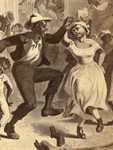BROWSE BY CATEGORY
- Archives and Libraries
- Blogs and Networking
- Bookmark This
- Digital Tools
- Examples of Teaching
- Exhibits
- Film Reviews
- History and Headlines
- Historic Sites and Museums
- Historical Thinking
- Holidays and Heritage
- Issues and Research
- Lesson Plans
- Material and Visual Culture
- Multimedia
- Organizations and Agencies
- Primary Sources
- Professional Development
- Publications
- Student Activities
- Teaching Materials
- Websites
Teaching the Emancipation Proclamation on Constitution Day

Are you ready for September 17? The National Endowment for the Humanities (NEH) is. This year, the NEH will celebrate Constitution Day by honoring the Constitution together with another pivotal document from U.S. history: the Emancipation Proclamation. With the Proclamation's 150th anniversary approaching, Constitution Day is the perfect time to compare and contrast the promises made in the Constitution and the Emancipation Proclamation.
From the NEH's Emancipation Resource Portal, you can access resources and learn more about planned events. Highlights include:
- A live, streamed performance on Constitution Day. A panel of Civil War scholars will "recreate the national scene and the dilemmas facing Americans on Sept. 22, 1862." Students will be able to submit questions via Twitter or email. (Register your "watch party" here.)
- A contest asking students to interpret a primary source from the Freedmen and Southern Society Project or Visualizing Emancipation. (The contest is limited to students 18 years of age or older, but consider adapting the contest concept for your own school or classroom.)
- Related lesson plans from EDSITEment.
- An interactive timeline of emancipation from 1850 to 1877.
For more on the Emancipation Proclamation, check out materials highlighted here on Teachinghistory.org. Watch 8th-grade teacher Jason Fitzgerald introduce his students to the Proclamation using letters from Civil War soldiers. (Download the letters here as you listen to historian Chandra Manning analyze their contents.)
Or join historian John Buescher in this Ask a Historian as he considers what makes a document a founding document. Is it a document that stands for part of what the U.S. represents? A document from the country's founding?
As your students prepare for Constitution Day, the NEH's theme gives you the perfect chance to ask, "In what ways are the Constitution and the Emancipation Proclamation both founding documents?" Analyzing them together gives students a unique opportunity to explore the changing definition of "We the People."
